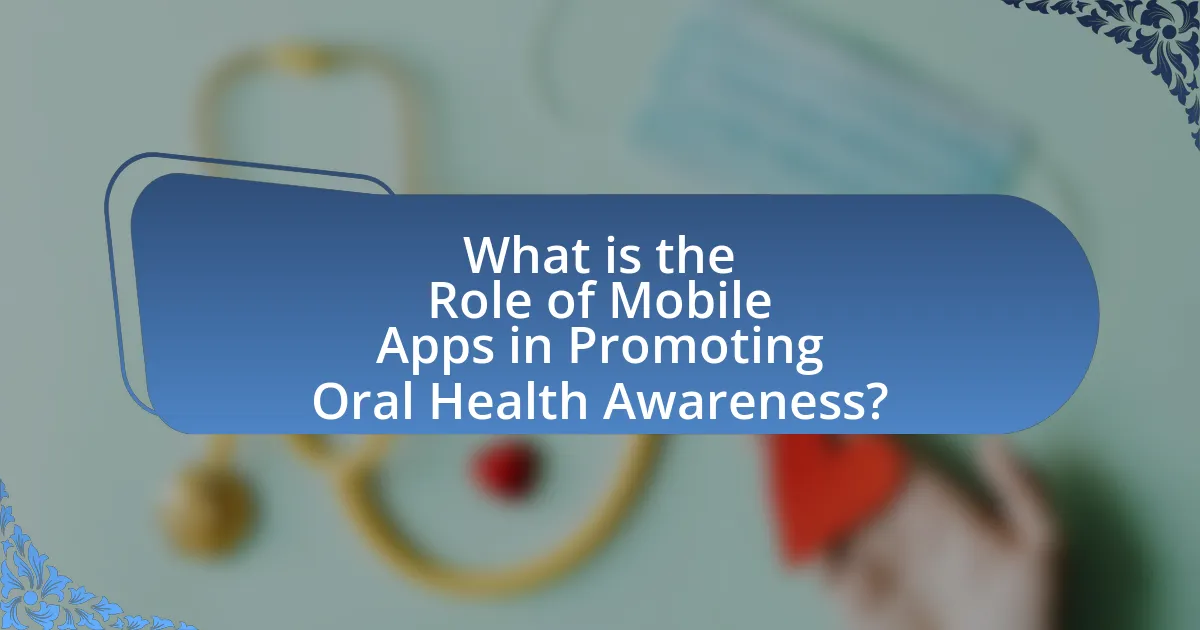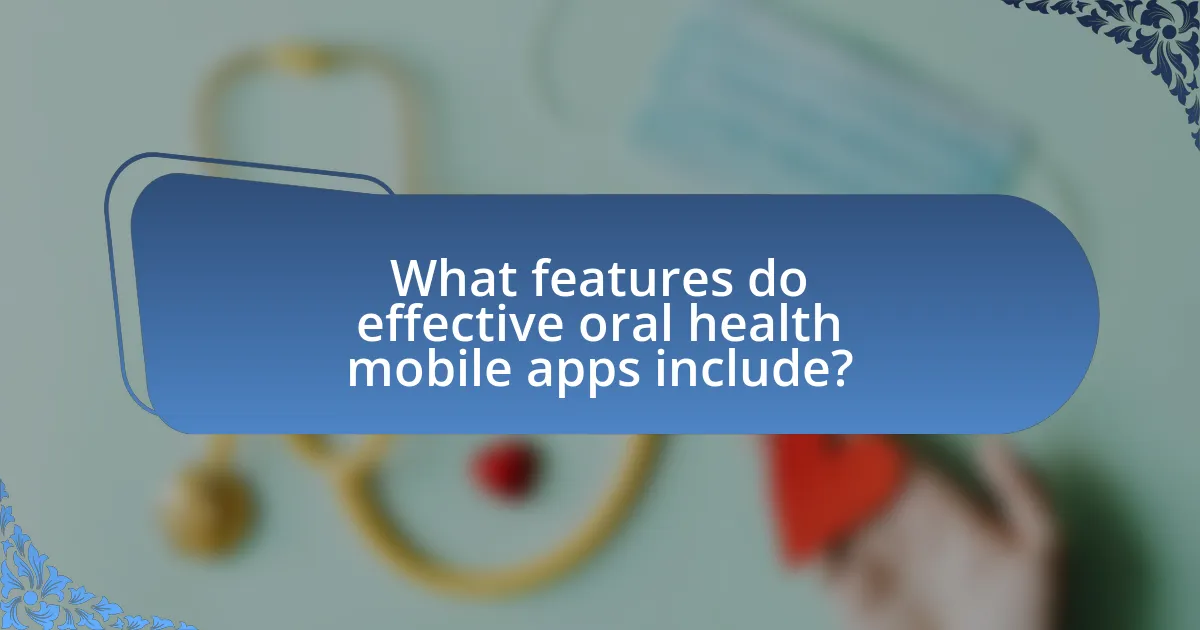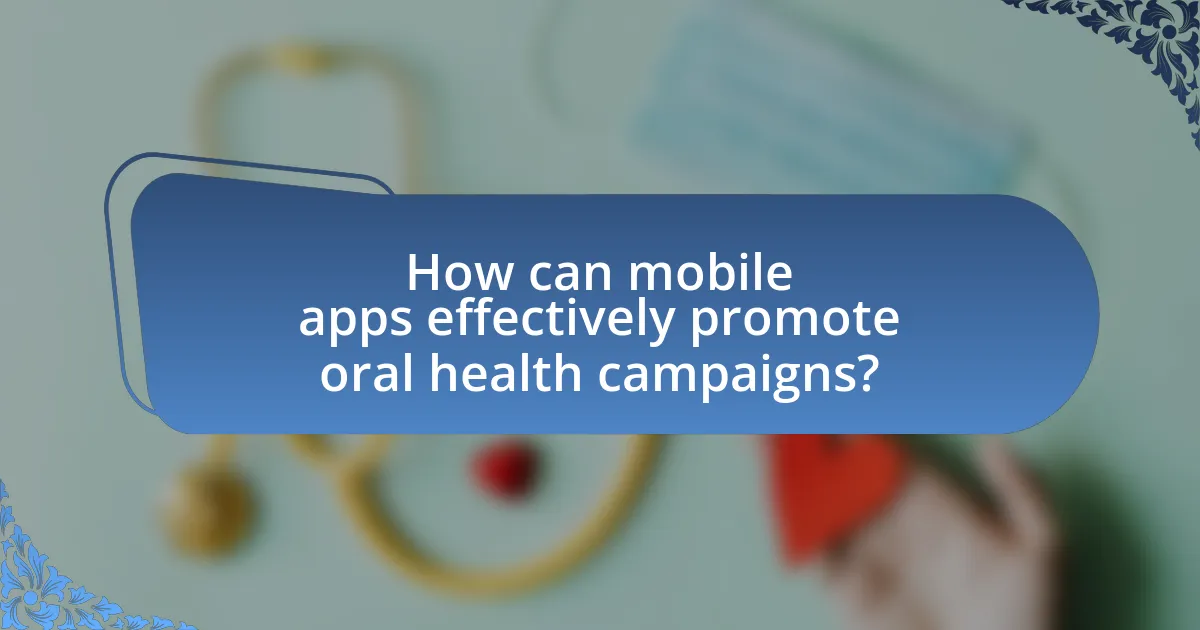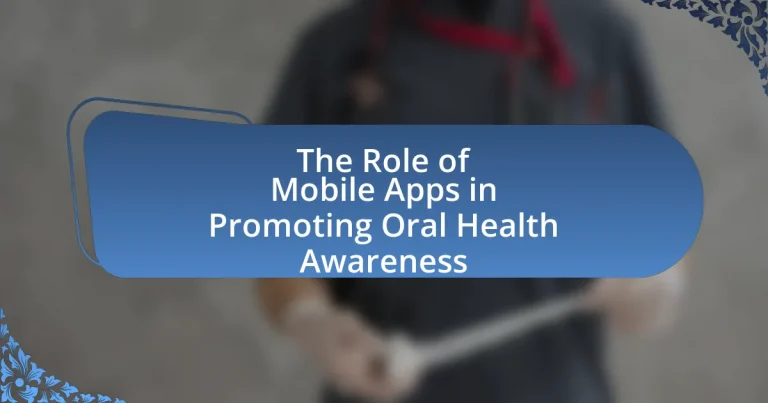Mobile apps play a significant role in promoting oral health awareness by providing accessible information, reminders, and interactive tools that enhance user engagement and education. These applications facilitate learning about oral hygiene practices, dietary choices, and the importance of regular dental check-ups, leading to improved health literacy and behavior change. Key features of effective oral health apps include personalized reminders, educational resources, and gamification elements that motivate users to maintain better oral health habits. Additionally, mobile apps can reach diverse populations through targeted content and community engagement, while addressing challenges such as misinformation and accessibility to maximize their impact on oral health awareness.

What is the Role of Mobile Apps in Promoting Oral Health Awareness?
Mobile apps play a crucial role in promoting oral health awareness by providing accessible information, reminders, and interactive tools for users. These applications facilitate education on oral hygiene practices, dietary choices, and the importance of regular dental check-ups, thereby enhancing user knowledge and engagement. For instance, studies have shown that mobile health interventions can significantly improve health literacy and behavior change, with a systematic review indicating that mobile apps can increase adherence to oral health practices by up to 30%. Additionally, features such as appointment scheduling and personalized reminders help users maintain regular dental visits, further contributing to improved oral health outcomes.
How do mobile apps contribute to oral health education?
Mobile apps contribute to oral health education by providing accessible information, interactive tools, and personalized reminders for users. These applications often include features such as educational content on dental hygiene practices, quizzes to test knowledge, and tracking systems for oral health habits. For instance, a study published in the Journal of Medical Internet Research found that mobile health applications significantly improved users’ knowledge and attitudes towards oral health, demonstrating their effectiveness in enhancing education.
What types of information do these apps provide to users?
Mobile apps promoting oral health awareness provide users with information on dental hygiene practices, oral disease prevention, and treatment options. These apps often include features such as educational articles, instructional videos, reminders for dental check-ups, and personalized oral care plans. For instance, studies indicate that apps can enhance user knowledge about proper brushing techniques and the importance of regular dental visits, leading to improved oral health outcomes.
How do mobile apps enhance user engagement in oral health topics?
Mobile apps enhance user engagement in oral health topics by providing interactive features, personalized content, and easy access to information. These applications often include gamification elements, such as quizzes and rewards, which motivate users to learn about oral health practices actively. For instance, a study published in the Journal of Medical Internet Research found that users of oral health apps reported increased knowledge and improved oral hygiene behaviors due to engaging content and reminders. Additionally, mobile apps facilitate community interaction through forums and social sharing, further increasing user involvement and commitment to oral health education.
Why are mobile apps important for oral health awareness?
Mobile apps are important for oral health awareness because they provide accessible information and resources that promote better oral hygiene practices. These applications can deliver personalized reminders for dental care routines, educational content about oral health, and tools for tracking dental appointments. Research indicates that mobile health interventions can significantly improve health outcomes; for instance, a study published in the Journal of Medical Internet Research found that mobile apps can enhance knowledge and self-efficacy regarding oral health among users. By leveraging technology, mobile apps effectively engage users and facilitate proactive management of their oral health.
What statistics support the effectiveness of mobile apps in health promotion?
Mobile apps have been shown to significantly enhance health promotion, with studies indicating that users of health-related apps experience a 30% increase in adherence to health guidelines. A systematic review published in the Journal of Medical Internet Research found that mobile health interventions can lead to a 50% improvement in health outcomes, particularly in chronic disease management. Furthermore, a survey by the Pew Research Center revealed that 60% of smartphone users have downloaded a health app, demonstrating widespread engagement and potential for impact in health promotion.
How do mobile apps reach diverse populations for oral health education?
Mobile apps reach diverse populations for oral health education by utilizing targeted content, multilingual support, and community engagement features. These applications often tailor educational materials to specific cultural contexts, ensuring relevance and accessibility. For instance, apps like “Brush DJ” and “My Dental Care” provide resources in multiple languages and incorporate culturally appropriate visuals and messaging. Research indicates that mobile health interventions can improve health literacy and outcomes among underserved populations, as evidenced by a study published in the Journal of Medical Internet Research, which found that mobile health apps significantly increased knowledge and engagement in oral health practices among diverse user groups.

What features do effective oral health mobile apps include?
Effective oral health mobile apps include features such as personalized oral care reminders, educational resources, and interactive tools for tracking oral hygiene habits. Personalized reminders help users maintain consistent brushing and flossing routines, which is crucial for preventing dental issues. Educational resources provide information on proper oral care techniques and the importance of regular dental visits, enhancing user knowledge. Interactive tools, such as progress tracking and gamification elements, engage users and encourage adherence to oral health practices. These features collectively contribute to improved oral health outcomes by promoting awareness and encouraging proactive care.
How do gamification elements improve user interaction with oral health apps?
Gamification elements improve user interaction with oral health apps by increasing engagement and motivation through game-like features such as rewards, challenges, and progress tracking. These elements encourage users to consistently participate in oral health activities, leading to better adherence to dental care routines. For instance, a study published in the Journal of Medical Internet Research found that users of gamified health apps reported higher levels of motivation and satisfaction, which directly correlated with improved health behaviors. By incorporating leaderboards and achievement badges, oral health apps create a competitive and rewarding environment that fosters regular use and enhances user experience.
What are some examples of gamified features in oral health apps?
Gamified features in oral health apps include reward systems, challenges, and progress tracking. For instance, apps like “Brush DJ” use timers and music to encourage users to brush for the recommended two minutes, while “My Dental Care” offers points for daily oral hygiene tasks. These features enhance user engagement by providing incentives, such as virtual rewards or badges, which can motivate users to maintain better oral health habits. Research indicates that gamification can significantly increase user adherence to health-related behaviors, making these features effective in promoting oral health awareness.
How does gamification impact user retention and learning outcomes?
Gamification significantly enhances user retention and learning outcomes by increasing engagement and motivation through game-like elements. Research indicates that incorporating features such as points, badges, and leaderboards can lead to a 30% increase in user engagement, as users are more likely to return to an app that offers rewards and challenges. Additionally, a study published in the Journal of Educational Psychology found that gamified learning environments improve knowledge retention by up to 50%, as they encourage active participation and reinforce learning through immediate feedback. These elements create a more interactive and enjoyable experience, ultimately leading to better retention rates and improved educational results in contexts such as oral health awareness.
What role does personalization play in oral health mobile apps?
Personalization in oral health mobile apps enhances user engagement and adherence to oral hygiene practices. By tailoring content, reminders, and recommendations based on individual user data, these apps can effectively address specific needs and preferences, leading to improved health outcomes. For instance, a study published in the Journal of Medical Internet Research found that personalized health interventions significantly increased user satisfaction and compliance with health recommendations. This evidence supports the notion that personalization is crucial for maximizing the effectiveness of oral health mobile applications.
How can user data be utilized to tailor oral health advice?
User data can be utilized to tailor oral health advice by analyzing individual behaviors, preferences, and health history to provide personalized recommendations. For instance, mobile apps can collect data on users’ brushing habits, dietary choices, and previous dental issues, allowing for customized reminders and tips that align with their specific needs. Research indicates that personalized health interventions can improve adherence to oral hygiene practices, as evidenced by a study published in the Journal of Dental Research, which found that tailored messages increased user engagement and compliance by 30%. This data-driven approach ensures that oral health advice is relevant and actionable, ultimately enhancing user outcomes.
What are the privacy considerations for personalized health apps?
Privacy considerations for personalized health apps include data security, user consent, and data sharing practices. These apps often collect sensitive personal health information, making it crucial to implement robust encryption methods to protect user data from unauthorized access. Additionally, obtaining informed consent from users before data collection is essential, ensuring they understand what data is being collected and how it will be used. Furthermore, transparency regarding data sharing with third parties is vital, as studies indicate that 79% of users are concerned about how their health data is shared. Compliance with regulations such as HIPAA in the United States also plays a significant role in safeguarding user privacy in health applications.

How can mobile apps effectively promote oral health campaigns?
Mobile apps can effectively promote oral health campaigns by providing interactive features that engage users, such as reminders for dental check-ups and educational content on oral hygiene. These apps can utilize gamification techniques, which have been shown to increase user engagement and retention; for instance, a study published in the Journal of Medical Internet Research found that gamified health apps led to a 30% increase in user participation in health-related activities. Additionally, mobile apps can facilitate community building through forums and social sharing, allowing users to share experiences and tips, which enhances the overall impact of the campaign. By leveraging push notifications, apps can deliver timely health tips and reminders, reinforcing positive behaviors and increasing awareness about oral health issues.
What strategies can be employed to increase app downloads and usage?
To increase app downloads and usage, developers should implement targeted marketing strategies, optimize app store listings, and enhance user engagement features. Targeted marketing strategies, such as social media advertising and influencer partnerships, can effectively reach potential users; for instance, a study by eMarketer found that targeted ads can increase conversion rates by up to 50%. Optimizing app store listings through keyword research and compelling visuals can improve visibility, as apps that rank higher in search results typically see a significant increase in downloads. Additionally, incorporating user engagement features like push notifications and gamification can enhance user retention; research indicates that apps with effective engagement strategies retain 30% more users after the first week.
How can partnerships with dental professionals enhance app credibility?
Partnerships with dental professionals enhance app credibility by providing expert validation and trustworthiness. When dental professionals endorse or collaborate with an app, they lend their authority and expertise, which can significantly influence user perception. Research indicates that 70% of consumers trust recommendations from healthcare professionals, making their involvement crucial for establishing credibility. Furthermore, apps that feature content or tools developed in conjunction with dental experts are more likely to be perceived as reliable and effective, leading to increased user engagement and adherence to oral health practices.
What marketing techniques are most effective for oral health apps?
The most effective marketing techniques for oral health apps include targeted social media advertising, influencer partnerships, and content marketing focused on educational resources. Targeted social media advertising allows for precise audience segmentation, ensuring that the app reaches individuals interested in oral health, which can lead to higher engagement rates. Influencer partnerships leverage the credibility of dental professionals or health influencers to promote the app, enhancing trust and visibility among potential users. Content marketing, particularly through blogs and videos that provide valuable oral health information, positions the app as a reliable resource, driving organic traffic and user acquisition. These techniques are supported by data showing that 70% of consumers are more likely to trust a brand when it is recommended by an influencer, and educational content can increase user retention by up to 30%.
What challenges do mobile apps face in promoting oral health awareness?
Mobile apps face several challenges in promoting oral health awareness, including user engagement, misinformation, and accessibility. User engagement is critical; many apps struggle to retain users due to lack of interactive features or personalized content, which can lead to decreased effectiveness in spreading awareness. Misinformation is another significant challenge, as users may encounter unreliable sources that undermine the credibility of the app’s information. Additionally, accessibility issues arise when apps are not designed for diverse populations, including those with varying levels of health literacy or disabilities, limiting their reach and impact. These challenges hinder the overall effectiveness of mobile apps in enhancing oral health awareness among the public.
How do technological barriers affect user access to oral health apps?
Technological barriers significantly limit user access to oral health apps by creating obstacles such as inadequate internet connectivity, device compatibility issues, and lack of digital literacy. For instance, individuals in rural areas may experience slow internet speeds or no access at all, which hinders their ability to download and use these applications effectively. Additionally, many oral health apps require specific operating systems or hardware capabilities that not all devices possess, further restricting access for users with older smartphones. Research indicates that approximately 25% of adults in the U.S. lack the necessary digital skills to navigate mobile applications, which can prevent them from utilizing oral health resources available through these platforms.
What are common misconceptions about mobile apps in health promotion?
Common misconceptions about mobile apps in health promotion include the belief that they are universally effective, that they can replace professional healthcare advice, and that all apps are evidence-based. Many users assume that mobile apps can address all health issues without considering individual needs or the necessity of professional guidance. Research indicates that while mobile health apps can enhance health awareness and behavior, their effectiveness varies significantly based on design, user engagement, and the quality of information provided. A study published in the Journal of Medical Internet Research found that only 30% of health apps are based on scientific evidence, highlighting the importance of selecting credible applications for health promotion.
What best practices should developers follow when creating oral health apps?
Developers should prioritize user-centered design when creating oral health apps to ensure usability and engagement. This involves conducting user research to understand the target audience’s needs and preferences, which can lead to features that resonate with users. Additionally, incorporating evidence-based content is crucial; apps should provide accurate information about oral health practices, supported by reputable sources such as the American Dental Association. Furthermore, ensuring data privacy and security is essential, as users must trust that their personal health information is protected. Regular updates and maintenance of the app can enhance functionality and user experience, keeping the content relevant and engaging. Lastly, integrating reminders and gamification elements can motivate users to maintain their oral health routines, as studies show that interactive features can increase user adherence to health recommendations.
How can user feedback be integrated into app development for better outcomes?
User feedback can be integrated into app development by employing systematic collection methods such as surveys, in-app feedback forms, and user testing sessions. These methods allow developers to gather insights directly from users regarding their experiences and preferences, which can then inform design and functionality improvements. For instance, a study by Nielsen Norman Group indicates that usability testing with real users can uncover issues that developers may overlook, leading to a 50% increase in user satisfaction when changes are implemented based on feedback. By continuously iterating on the app based on user input, developers can enhance user engagement and retention, ultimately resulting in better outcomes for the app’s effectiveness in promoting oral health awareness.
What are the key considerations for ensuring app usability and accessibility?
Key considerations for ensuring app usability and accessibility include intuitive navigation, clear visual design, and compliance with accessibility standards. Intuitive navigation allows users to easily find features and information, enhancing their overall experience. Clear visual design, including appropriate color contrast and font size, ensures readability for all users, including those with visual impairments. Compliance with accessibility standards, such as the Web Content Accessibility Guidelines (WCAG), provides a framework for making apps usable for individuals with disabilities, ensuring that all users can effectively engage with the app’s content.


